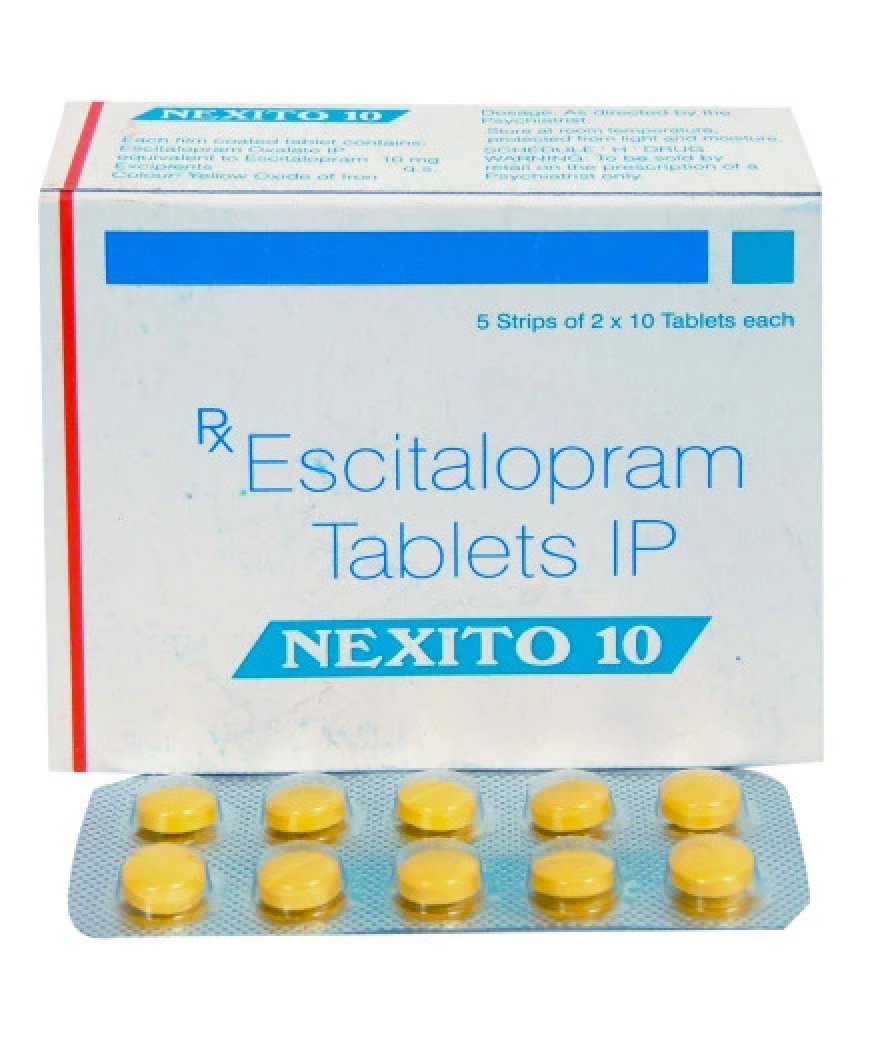Understanding Escitalopram: How This SSRI Can Help Manage Depression
Escitalopram works by inhibiting the reuptake of serotonin in the brain. Normally, after serotonin is released into the synaptic cleft, it is reabsorbed back into the presynaptic neuron.

Depression is a complex and challenging mental health condition that affects millions of people globally. While there are various treatment options available, Selective Serotonin Reuptake Inhibitors (SSRIs) have become a cornerstone in managing depression. Among them, Escitalopram, commonly known by the brand name Lexapro, is widely recognized for its effectiveness and relatively mild side effects. This article provides an in-depth understanding of how Escitalopram works and its role in helping manage depression.
What is Escitalopram?
Overview of Escitalopram
Escitalopram is a type of antidepressant that belongs to the SSRI class of medications. It is primarily used to treat major depressive disorder (MDD) and generalized anxiety disorder (GAD). Escitalopram is known for its efficacy in improving mood, reducing anxiety, and enhancing overall mental well-being.
The Chemistry Behind Escitalopram
Escitalopram is the S-enantiomer of citalopram, which means it is a more refined and potent version of the drug. Enantiomers are mirror-image forms of a molecule, and in this case, the S-enantiomer is more effective in inhibiting serotonin reuptake. This selectivity makes Escitalopram one of the most effective SSRIs available.
How Does Escitalopram Work?
The Role of Serotonin in Depression
Serotonin is a neurotransmitter that plays a crucial role in regulating mood, emotions, and anxiety. Low levels of serotonin are often linked to depression, leading to symptoms such as sadness, hopelessness, and lack of interest in activities.
Mechanism of Action
Escitalopram works by inhibiting the reuptake of serotonin in the brain. Normally, after serotonin is released into the synaptic cleft (the space between nerve cells), it is reabsorbed back into the presynaptic neuron. This reabsorption reduces the amount of serotonin available to bind to receptors on the postsynaptic neuron. By blocking this reuptake process, Escitalopram increases the concentration of serotonin in the synaptic cleft, enhancing its availability and improving communication between nerve cells. This leads to an improvement in mood and a reduction in depressive symptoms.
Benefits of Escitalopram in Managing Depression
Effective Symptom Relief
One of the most significant benefits of Escitalopram is its effectiveness in relieving symptoms of depression. Many patients experience a noticeable improvement in mood, energy levels, and overall quality of life within a few weeks of starting treatment. Escitalopram not only alleviates the emotional symptoms of depression but also helps with physical symptoms such as fatigue and changes in appetite.
Dual Action on Depression and Anxiety
Escitalopram is also effective in treating anxiety disorders, which often co-occur with depression. Its dual action on both depression and anxiety makes it a versatile treatment option for individuals suffering from both conditions. This can be particularly beneficial for patients who experience generalized anxiety disorder alongside their depression.
Favorable Side Effect Profile
Compared to other antidepressants, Escitalopram is known for having a relatively mild side effect profile. Common side effects include nausea, drowsiness, dry mouth, and increased sweating. However, these side effects are usually temporary and tend to diminish as the body adjusts to the medication. Moreover, Escitalopram has a lower incidence of sexual dysfunction compared to other SSRIs, making it a more tolerable option for many patients.
Considerations for Escitalopram Use
Dosage and Administration
Escitalopram is typically prescribed in doses ranging from 10 mg to 20 mg per day, depending on the severity of the condition being treated. It is usually taken once daily, either in the morning or evening. It's important to follow the prescribed dosage and not to stop taking the medication abruptly, as this can lead to withdrawal symptoms or a relapse of depression.
Potential Side Effects
While Escitalopram is generally well-tolerated, it can cause side effects, particularly during the initial stages of treatment. Common side effects include:
- Nausea
- Fatigue
- Insomnia
- Dry mouth
- Dizziness
- Weight changes
In rare cases, Escitalopram can cause more serious side effects, such as:
- Suicidal thoughts or behaviors, particularly in young adults
- Serotonin syndrome, a potentially life-threatening condition caused by excessive serotonin accumulation
- QT prolongation, a heart rhythm disorder
Patients should be closely monitored by their healthcare provider, especially during the first few weeks of treatment.
Drug Interactions
Escitalopram can interact with other medications, leading to potential side effects or reduced effectiveness. It's important to inform your healthcare provider about all the medications you're taking, including over-the-counter drugs and supplements. Certain medications, such as other SSRIs, monoamine oxidase inhibitors (MAOIs), and nonsteroidal anti-inflammatory drugs (NSAIDs), can increase the risk of side effects when taken with Escitalopram.
Patient Experiences and Success Stories
Improved Quality of Life
Many patients report significant improvements in their quality of life after starting Escitalopram. They often describe feeling more balanced, with a greater ability to handle stress and engage in daily activities. For some, Escitalopram has been life-changing, helping them regain a sense of normalcy and well-being.
A Word of Caution
While Escitalopram can be highly effective for many, it's important to remember that everyone's experience with antidepressants is different. Some patients may not respond to Escitalopram or may experience intolerable side effects. In such cases, healthcare providers may recommend adjusting the dosage or switching to a different medication.
Conclusion
Escitalopram is a powerful tool in the management of depression, offering effective relief from symptoms with a relatively mild side effect profile. Its ability to increase serotonin levels in the brain helps alleviate the emotional and physical burdens of depression, making it a leading choice among SSRIs. As with any medication, it's essential to work closely with a healthcare provider to determine the best treatment plan for your individual needs. If you're struggling with depression, Escitalopram could be the key to helping you regain control of your life and improve your overall mental health.
What's Your Reaction?



















![Safe Abortion pills[[+971521786258]] Doha Qatar/Ar Rayyan Qatar/Umm Salal Mu?ammad Qatar/Al Wakrah](https://news.bangboxonline.com/uploads/images/202501/image_430x256_679bc869b24fb.jpg)



